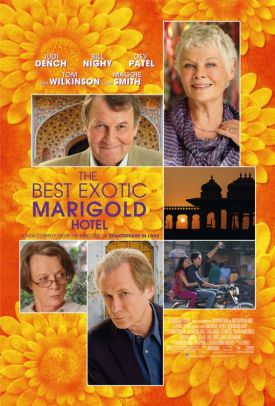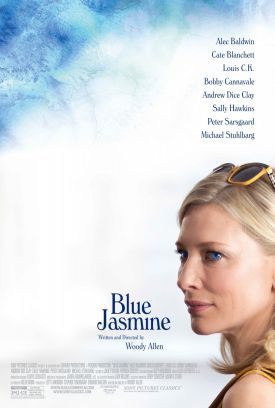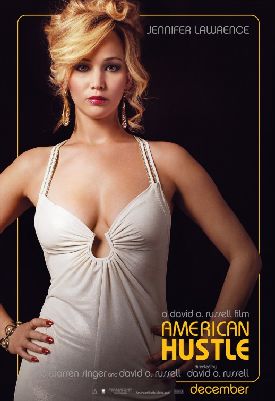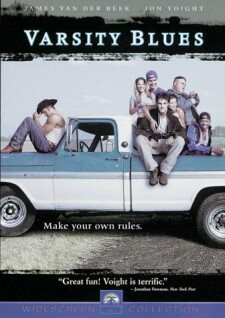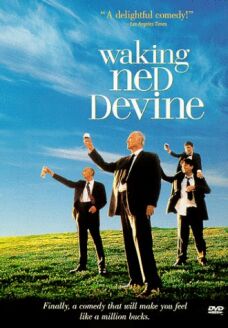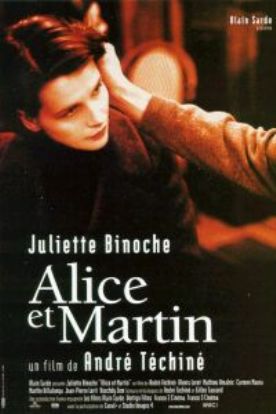Best Exotic Marigold Hotel, The
The Best Exotic Marigold Hotel is a Richard Curtis movie without Richard Curtis. Director John Madden (Shakespeare in Love) and screenwriter Ol Parker have produced something a little more down-to-earth than the truly awful Love Actually (2003) by Mr. Curtis, but not by much. Both films treat the initiation of extramarital sexual congress in the same way Victorian novelists treated marriage, that is as a synecdoche for happiness and the reward of virtue. Both, too, appear to regard this image of human felicity, treated as an unquestioned end in itself, the way Keats regarded his identification of truth and beauty: that is, as “all/Ye know on earth, and all ye need to know.” In practice, of course, everyone knows that this is absurd, just as the Victorians were not such fools as to suppose that marriages are always happy. But in neither case does that affect the literary usefulness of the symbolism, or what it tells us about our respective cultures.
What is mildly more interesting about Mr Madden’s movie as compared to Mr Curtis’s is the extent to which its theme of culture clash between contemporary Britain and India is at odds with and renders even more incoherent than it would otherwise be the theme of self-realization and self-fulfilment through sex. Both men would presumably call this self-fulfilment “love,” but it signally lacks love’s unselfishness and desire for permanence, its resolution and its well-known downside, which is what makes resolution necessary to the hope of permanence. Mr Madden’s tale of seven elderly English folk seeking a cheap retirement community and, as some of them are more aware than others, sexual hook-ups in Jaipur, India, thus reduces love among these old people to what it mostly is for young ones: namely, sexual attraction and response. The only married couple in the bunch can find their fulfilment only by splitting up.
Of course, the movie could never have been made if not for the fact that this is more or less what love means to many more people today than Richard Curtis or John Madden, but it is helpful to have the idea put forth so crassly once in a while. It provides a mirror in which we can see ourselves, though we may find that we don’t much like what we see — namely, the trivialization of sexual relationships, which is the inevitable consequence of treating a means to an end as the end in itself, and ourselves as worshipers of the now, engaged in an inevitably futile attempt to abolish time. For that is the subtext of the film. The promise of India for these seventy-somethings is the promise of a chance to do away with the promises, implicit and explicit, of their earlier adult lives, along with the rest of those lives, and to start again as twenty-somethings.
There is a natural contrast with a still comparatively tradition- (and therefore time-)bound India, but the film has almost no interest in it. Mr Madden’s Indians are a grotesque and sentimental caricature. There are of course hints here and there that they have a rather different view of love and sex from that of the Europeans. Graham (Tom Wilkinson), the high court judge who is the homosexual member of the party, has lived a lifetime of regret after his youthful affair with an Indian friend resulted in the latter’s disgrace. Sonny, the principal Indian character and entrepreneurial proprietor of the eponymous hotel, played by Dev Patel of Slumdog Millionaire, is also in love with (and sleeping with) Sunaina (Tena Desae) in defiance of an arranged marriage to someone else as planned by his domineering mother (Lillete Dubey). But these outdated notions are no match for the more enlightened views now typical in the land of India’s former imperial masters. Likewise, Graham, who is at last reunited with his long-ago inamorato, gets a tender embrace from him as his wife (another arranged marriage) looks on approvingly, before conveniently dropping dead.
It would be tedious to go over the other characters’ quest for personal fulfilment, though that of one of them (Maggie Smith) does not involve the epiphanic bliss of what the Brits call legover action — perhaps because her motivation in going to India is to get a cheap hip replacement — and that of another (Judi Dench) does so only incidentally and by implication. More interesting is Sonny’s entrepreneurial dream of business success by finding a way “to outsource old age,” though from his point of view it would more accurately be called insourcing. Anyway, what it amounts to is uprooting these old folks from their families and communities, none of which seem to matter very much to any of them, or to exert any countervailing pull on them to lessen the sexual one, and putting them instead on what amounts to a permanent singles cruise. It turns out to be an easy sell.
Interestingly, the idea of a permanent cruise as a solution to the social and economic problem of our ever-increasing numbers of useless oldies is also a feature of Albert Brooks’s novel 2030: The Real Story of What Happens to America — a book whose “dystopian” character perhaps gives a more accurate picture of what this would actually be like in a world where the young have the strongest interest in relieving themselves of the burden of the aged by cutting them off from the more traditional harbors in which old age and enfeeblement find refuge. Mr Madden, like the cruise director, obviously has an interest in persuading the oldsters that this deracination means they are once again young and fancy-free in a place where no one will care what they get up to with each other, and there are a fair few who must be more than willing to be persuaded. All the same, I doubt that Sonny’s business plan could be a big success, though we may find that there are more takers for the dream of geriatric sexual questing among movie-audiences, which are mostly made up of young people.
Discover more from James Bowman
Subscribe to get the latest posts to your email.

